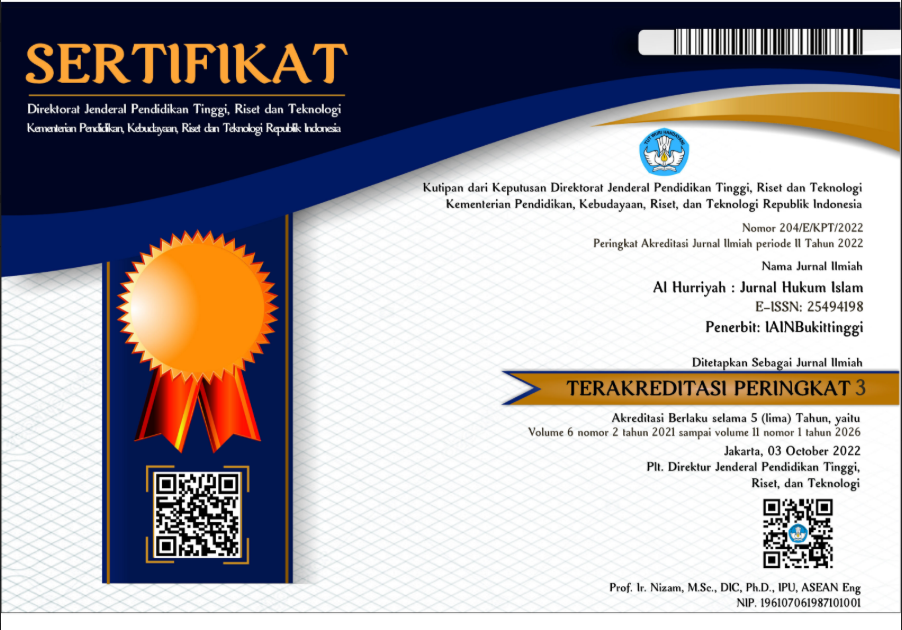PENGARUSUTAMAAN GENDER DALAM PEMIKIRAN HUKUM IMÂM ABÛ HANÎFAH DAN RELEVANSINYA DENGAN PEMBAHARUAN HUKUM ISLAM
DOI:
https://doi.org/10.30983/alhurriyah.v1i1.479Abstract
References
Ahmad, Jamil, Seratus Muslim Terkemuka, terjemahan dari Hundret Great Muslims, Jakarta: Pustaka Firdaus, Cet. IV, 1994.
al-Hanafî, al-Tarabalis, Mu’în al-Hukkâm fî Ma Yataraddad al-Khasmaini min al-Ahkâm. Mesir: Musthafa al-Bâbi al-Halabi, 1973.
al-Jauziyah, ibn Qayyim, ditahqiq oleh Muhammad 'Abd al-Salam Ibrahim, I'lâm al-Muwaqqi’în 'an Rabb al-'Âlamîn, Beirut : Dar al-Kutub al-'Ilmiyah, Cet. I, 1991.
al-Kahlânî, Muhammad ibn Ismâ’îl, Subul al-Salâm, Bandung: Dahlan.
al-Kasânî al-Hanafî, ‘Alâ al-Dîn Abu Bakr ibn Mas’ud, Badâ`i’ al-Shanâ`i’ fî Tartîb al-Syarâ`i’, Mesir: Syirkah al-‘Ilmiyah, 1327 H.
al-Maqdisî, ibn Qudâmah, al-Mughni, Kairo: Musthafa al-Bâbi al-Halabi.
al-Marâghî, Ahmad Musthafa, Tafsîr al-Marâghî, Beirut: Dâr al-Fikr, Cet. II, 1974.
al-Qaththân, Mannâ’, Tarîkh al-Tasyrî’ al-Islâmî. Riyâdh: Maktabah al-Ma’ârif li al-Nasyr wa al-Tauzî’, 1992.
al-Ramlî, Syams al-Dîn Muhammad ibn Ahmad, Nihâyah al-Muhtâj, Kairo: al-Muniriyah.
al-Sarkhisî, Syams al-Dîn Muhammad ibn Ahmad ibn Sahal, al-Mabsûth, Beirut: Dâr al-Fikr, 1989.
al-Sibâ’î, Musthafâ, al-Mar`at Bain al-Fiqh wa al-Qânûn, Damaskus: Maktabah al-‘Arabiyah, Cet. II.
al-Suyûthî, Jalal al-Dîn Abd al-Rahman ibn Abi Bakr, al-Asybah wa al-Nazhâ`ir fi al-Furû', Beirut: Dâr al-Kitâb al-'Arabiy, 1987.
al Syarbini, Muhammad al Khâtib, Muqhnî al Muhtâj Ilâ Ma'rifah Ma’ânî Alfâzh al-¬Minhâj, Beirut: Dâr al Fikr.
al-Syirazî, Abu Ishâq, al-Muhadzdzab, Kairo: Al-Tijâriyah al-Kubrâ.
al-Zuhailî, Wahbah, al-Fiqh al-Islâmî wa Adillatuh, Beirut: Dâr al-Fikr, Cet. III, 1989.
Ash Shiddiqy, Hasbi, Pokok-pokok Pegangan Imam Mazhab, Jakarta: Bulan Bintang, Cet. I, 1974.
Beik, Khudari, Tarikh Tasyri’ al-Islâmi, terj. M. Zuhri, Indonesia: Darul Ihya.
Ibn al-Humâm al-Hanafî, Kamal al-Dîn Muhammad ibn Abd al-Wahid Sayûsî, Syarh Fath al-Qadîr, Beirut: Dâr al-Fikr.
ibn al-Humâm al-Hanafî, Kamâl al-Dîn Muhammad ibn Abu al-Wâhid al-Sayûsi, Syarh Fath al-Qadîr, Beirut: Dâr al-Fikr.
Ibn Hazm, Abu Muhammad ibn Sa'îd, al Muhallâ, Beirut: Dâr al Fikr.
Ibn Rusyd, Bidâyah al-Mujtahid wa Nihâyah al-Muqtashid, Semarang: Pustaka Keluarga.
Ismâ’îl, Sya’bân Muhammad, Tasyrî’ al-Islâmî Mashâdiruh wa Athwâruh, Kairo: Maktabah al-Nahdhah al-Mishriyyah, Cet. II, 1985.
Mahmassani, Shabhi, Filsafat Hukum Dalam Islam, terj. Ahmad Soedjono, SH, Bandung: Al-Ma’arif, Cet. II, 1981.
Mernissi, Fatima, “Penafsiran Feminis Tentang Hak-hak Perempuan Dalam Islamâ€, dalam Charles Kurzman (ed.)., Wacana Islam Liberal, Pemikiran Islam Kontemporer tentang Isu-isu Global, terj. Bahrul Ulum dan Heri Junaidi, Jakarta: Paramadina, Cet. I, 2001.
Musyarrafah, Athiyah Mustafa, al-Qadhâ` fî al-Islâm.
Downloads
Published
How to Cite
Issue
Section
Citation Check
License
Authors who publish with this journal agree to the following terms:
- Authors retain copyright and grant the journal right of first publication with the work simultaneously licensed under a Creative Commons Attribution-ShareAlike 4.0 International License that allows others to share the work with an acknowledgment of the work's authorship and initial publication in this journal.
- Authors are able to enter into separate, additional contractual arrangements for the non-exclusive distribution of the journal's published version of the work (e.g., post it to an institutional repository or publish it in a book), with an acknowledgment of its initial publication in this journal.
- Authors are permitted and encouraged to post their work online (e.g., in institutional repositories or on their website) prior to and during the submission process, as it can lead to productive exchanges, as well as earlier and greater citation of published work (See The Effect of Open Access).





